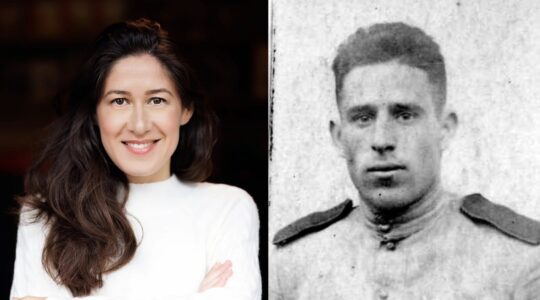Jerusalem — Every time Eyal Gura, co-founder and chairman of Zebra Medical Vision, creates a start-up company, he earmarks a certain number of stock options for his employees in the event the company is bought out or goes public.
He also puts aside options for philanthropic purposes through a nonprofit organization called Tmura-The Israeli Public Service Venture Fund.
Founded in 2002 by Israeli venture capitalist Yadin Kaufmann, Tmura encourages Israeli and other Jewish entrepreneurs to set aside options for charitable causes in the hope those options will be valuable one day. In 15 years, the donated options Tmura has received from some 525 companies have generated more than $15 million for youth-related and educational initiatives in Israel.
“After seeing many successful exits, Yadin wanted to find a way to get the Israeli venture capital and high-tech startup communities more involved in philanthropy,” Baruch Lipner, Tmura’s executive director and sole employee, told The Jewish Week.
Early-stage startup and other early-stage companies “don’t have the available cash to make charitable donations, even if they want to be good corporate citizens,” Lipner said. “We ask companies for options in their companies, and if and when the company has an exit, i.e., gets acquired or goes public, we’re able to cash in our shares and donate the money.”
Tmura receives donations of equity stock and stock options, and once a company’s shares become liquid, Tmura exercises the options and sells the shares. Then it allocates the proceeds of those donations to a wide variety of programs.
To date, Lipner said, the fund has distributed proceeds from more than 85 exits, “and we’re sitting on a portfolio of hundreds of active companies.” Entrepreneurs often build more than one company, he noted.
Many of the younger Israeli companies that choose to donate money via Tmura are relatively small, Lipner said. Larger, more established companies often run their own charitable-giving programs, encouraging their employees to volunteer their time and money.
Tmura was modeled on the Entrepreneurs Foundation (which has since become the Silicon Valley Community Foundation), an organization that pioneered the “options for charity” concept.
“When we heard about it, we thought it was perfect for the Israeli ecosystem,” Lipner said.
Tmura’s biggest success story is Waze, the famed Israeli navigation company, which donated options to the organization when the company was still in its infancy.
“No one knew it would be a great success story,” Lipner said, noting that when Google bought the company, Tmura’s options from Waze totaled $1.5 million.
“Waze was thrilled that this philanthropy was part of their exit,” he said.
Three of the five companies that Gura has created have exited, and Tmura donated the options’ proceeds to two nonprofit organizations. One addresses food insecurity, the other educational leadership.
Gura said it felt “natural” to donate options during his company’s early days because he was raised to appreciate the importance of tzedakah — charity.
“At home we were taught that if you are lucky and a field is full of fruit, you leave some aside for less privileged people. So when I heard about the Tmura model I donated options and joined its board of advisers. I wanted to encourage young entrepreneurs, start-up incubators and venture capitalists to consider philanthropy when they create their first capitalization table, so that when they distribute shares of their company, ideally Tmura will be there.”
Tmura thoroughly vets the non-profits that receive the proceeds, to make sure they are run efficiently and transparently, and provides guidance and support to help them reach specified goals.
“We seek out organizations that are relatively small and are scalable. We often focus on education because donors are eager to teach the next generation, especially youth who are underprivileged or otherwise at risk.”
One of those organizations, HaGal Sheli (My Wave), has taught more than 1,000 at-risk teens in danger of dropping out of school how to surf. The training builds skill and self-confidence.
Yaron Waksman, founder and CEO of HaGal Sheli, said Tmura put his organization through a long process of due diligence.
“It was the first fund that really looked into us, checked what we do, why and how we run the organization. They asked us how we manage our funds. It was a great learning process for us.”
Tmura “also set milestones for us to grow and we had to meet these milestones before receiving all the funding. It made us think not only about what we’re doing now but how we plan to run our organization in the future to maintain sustainability,” Waksman said.
Among other things, Tmura has helped the organization launch a mentors program that’s producing the next cohort of young leaders.
“Tmura really changed the way we think. They’re not just writing a check,” Waksman said.
Krembo Wings, a youth movement for children and teens with disabilities, received NIS 1.5 million shekels ($375,000) from Waze via Tmura when the company was acquired.
“For an organization with a NIS 22 million ($5.5 million) budget, this was a very significant donation,” said Meraz Boaz-Boozy, Krembo Wing’s deputy director and director of resource development.
Though thrilled to receive the donation, the organization’s administrators weren’t surprised that the Waze team had chosen them.
“I met Waze’s leaders and saw they want to be a shaliach mitzvah, a catalyst for good and social change,” Boaz-Boozy said. “We believe in this too. By bringing together kids with and without disabilities, we’re fostering inclusion and the belief that everyone has a place, everyone contributes.
“We’re a good match for each other,” she said.
The New York Jewish Week brings you the stories behind the headlines, keeping you connected to Jewish life in New York. Help sustain the reporting you trust by donating today.




